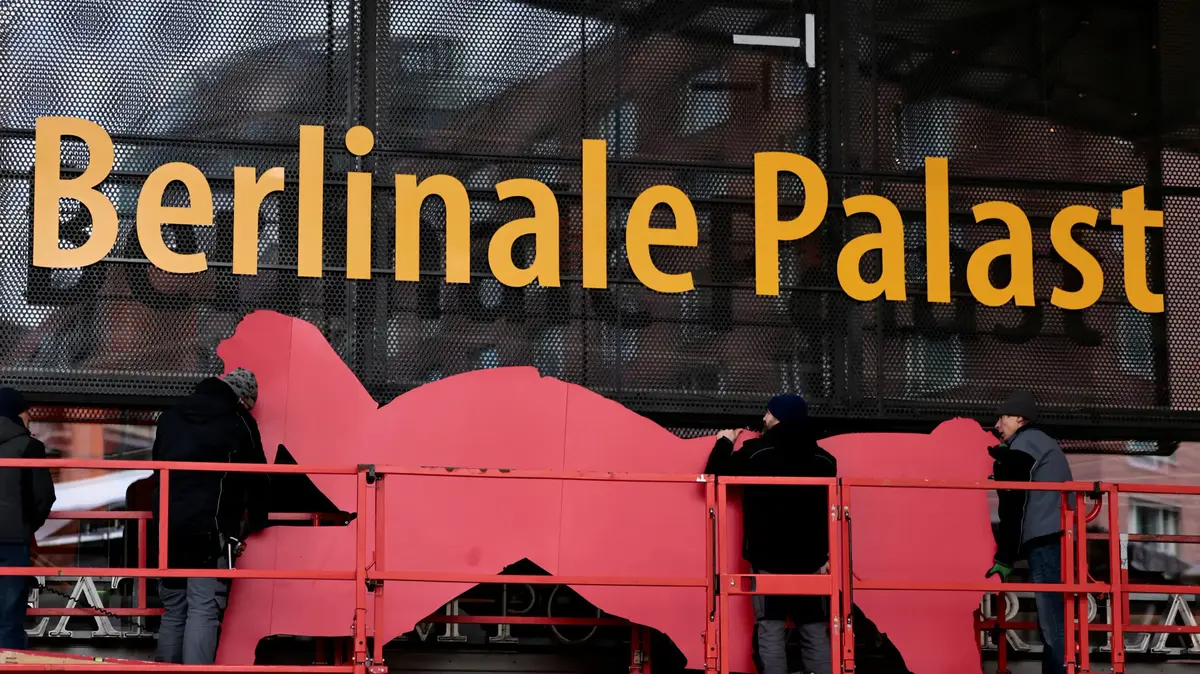There they are again: tens of thousands of visitors have been jostling, chatting and partying at the Hamburg Festival of Online Marketing Rockstars (OMR) since Tuesday morning, one of the first major events in the digital industry since the beginning of the corona crisis.
A maximum of one in ten wears a mask on the exhibition grounds, and anyone who wants to keep their distance from others will not get far - some passages are so full.
"It would be better if there were fewer people," says a woman in one of the courtyards - and she's not even thinking about Corona, just trying to meander around queues in front of food stalls.
Welcome back to the stimulating, exhausting world of offline conferencing.
The OMR Festival is a hybrid: a buzzword and celebrity wonderland during the day, with guest stars like musician will.i.am and director Quentin Tarantino, and a large disco at night with performances by artists like Oli P. and Marteria.
Lectures can be found on almost every digital topic that remotely sounds like the future and making money.
The talks on around 30 stages sound like a parody of such a conference: "How brands can be successful in the NFT space", "Marketplaceification - Why marketplaces will dominate every industry" or "Unleash the power of the Metaverse".
The title of a party is also »Ready for Metaverse«.
That being said, a lot is about TikTok and influencer marketing, but it rarely gets controversial even with controversial topics like NFTs and the so-called Web3.
At least one exciting topic has its place: In one of the first lectures, consultant Ann-Katrin Schmitz emphasizes that the topic of "shitstorm management" is becoming increasingly important for companies.
Everyone here knows the current context: Fynn Kliemann.
The DIY YouTuber was one of the showcase creatives at this year's festival - until Jan Böhmermann and his team accused him of mask fraud.
Kliemann should have appeared, no kidding, under the headline "Why actions are more important for brands today than words".
Among the companies presenting themselves in the festival's exhibitor area are companies with strange business models.
There is Tony, for example, a "petfluencer agency" from Düsseldorf, which provides dogs and cats known from social media as advertising partners.
Or an OMR outpost of the "Museum of Popcorn", a brightly colored backdrop for Instagram photos in Hamburg's warehouse district.
For 25 euros you can take photos and film yourself there for two hours.
When I hear the term scenery, Meta's workplace simulation »Horizon Workrooms« comes to mind, which my colleague Janne Knödler and I tried out at the event.
We were transported to a virtual beach via headset for a meeting in VR.
However, apart from the scenery, this was no more exciting than normal conferences.
We could hold controllers like pens and scribble on a whiteboard together or give each other virtual high fives.
But we couldn't swim a lap in the sea or fly around for inspiration.
Wouldn't that be the future of brainstorming?
Boundless Metaverse, where are you?
For me, a good antithesis to all the digital world hype on the stages was an interview with Benedict Evans, a long-time and sharply analyzing observer of the technology industry.
He finds it difficult to even talk about the metaverse because the term is so broad and vague.
When we tell him about our VR meeting on the beach, Evans says he thinks the really interesting things about software for the workplace aren't about more immersion or having a bigger screen.
"It's about automation and the flow of work and the computer doing things for you." Evans says an advert from the early 1980s, which advertised a monitor that could display more characters, comes to mind than others, according to the motto: With us you have five lines more spreadsheet.
That's "not the future," says Evans.
"The future is not having spreadsheets."
During the conversation, the lecture »Every brand needs a metaverse strategy« begins on one of the main stages.
When I mention its title, Evans says, "What the hell does that mean?" Talking about metaverse strategies for any brand now is like thinking about mobile internet back in 2000—without it being to know the mass phenomenon.
"Nobody predicted Tinder or Uber," says Evans.
As then, it is still unclear today which device will prevail with regard to the Metaverse, according to Evans.
VR headsets?
Mixed reality headsets?
Normal glasses with built-in technology?
Or do you need neuroimplants?
As a company, you should be interested in the Metaverse, advises Evans, »do an experiment.
Knowing what's going on.” But that's all there is to it.
“There aren't any consumers using 'the Metaverse' today.
You can't buy anything.
You can't do anything.
It does not exist."
You can see it similarly even with meta.
Following our trip to the beach, it was important for the company to emphasize that the VR apps that are now available, such as Horizon Workrooms, are not yet "the Metaverse" that Mark Zuckerberg is promising.
"You have to be aware that for now we're just showing what the Metaverse can be," a spokesperson told me.
"But the Metaverse itself is something that will only develop over the next 5 to 15 years." Even Meta, as a giant corporation, still needs time for the hardware and software, they say, in order to make its vision of the Metaverse a reality .
Our current Netzwelt reading tips for SPIEGEL.de
»How Sixt talks about its IT problems« (four minutes of reading)
The car rental company Sixt has become the target of a hacker attack.
The company hardly reveals any details about the incident - its press office simply dismissed various observations by SPIEGEL as if real restrictions for customers were either not bad or non-existent.
'Are you becoming a censorship ylva now, Inspector?
« (two minutes of reading)
EU Commissioner Ylva Johansson has triggered a wave of indignation with her proposed law to combat child abuse.
In an interview with Max Hoppenstedt and Marcel Rosenbach, she explains her controversial plans.
»The Vinted militia is fed up« (eight minutes of reading)
The Vinted portal, which is primarily known for its second-hand clothes, has millions of members – which also attracts online criminals.
Some users have now declared war on them.
However, they feel left alone by Vinted.
External links: three tips from other media
»OMR on YouTube« (live streams and recordings)
From the couch: If you don't feel like the crowds at the trade fair, you can watch many presentations from the OMR Festival on YouTube.
"15,000 unopened e-mails" (two minutes of reading)
There are also messies in the digital world, explains Michael Moorstedt in the "Süddeutsche Zeitung" - and reports how the limit of his cloud storage is putting him under pressure.
»How a lost iPhone achieved frequent flyer status within a few days« (three minutes of reading)
A cell phone that has been left on the plane should be found quickly – that's what people think.
At »Mac & i«, Malte Kirchner talks about how a smartphone continued to travel without its owner.
Have a good rest of the week
Markus Boehm















